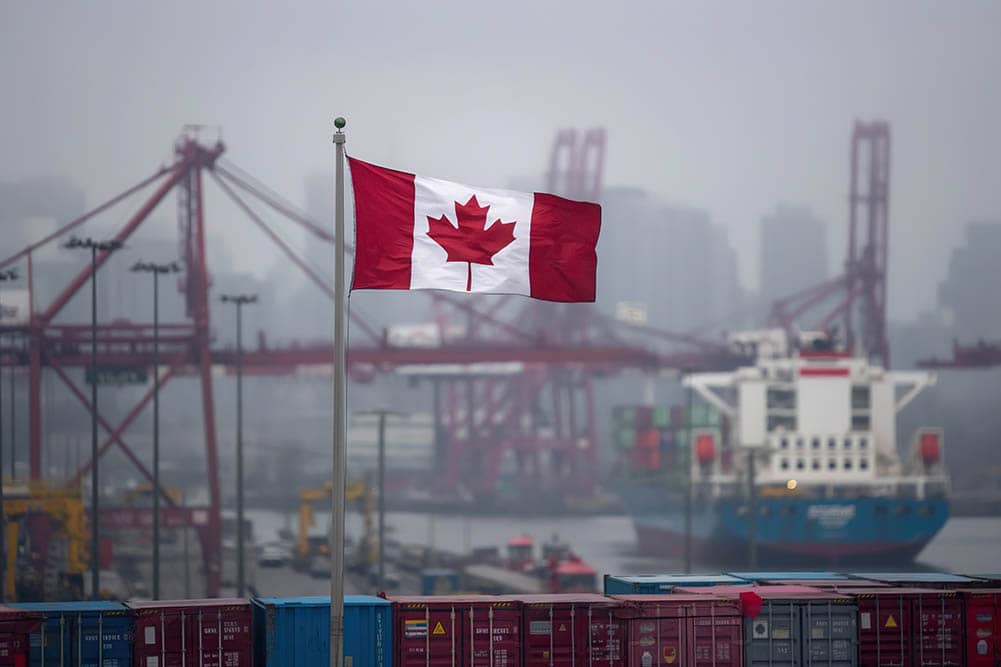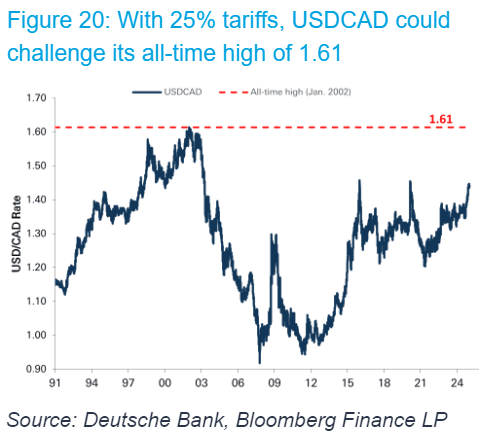Canadian Dollar All-Time Lows Forecast
- Written by: Gary Howes

Image © Adobe Images
The Canadian Dollar is forecast to fall to all-time lows if the U.S. imposes a 25% import tariff on Canadian goods.
New financial research and commentary shows the Canadian Dollar looks at risk of testing all-time lows if the U.S. proceeds with a 25% import tariff on Canadian goods on February 01.
The threat made by Trump on his inauguration sent the CAD hurtling lower. It has been met with a firm response from Canada's Prime Minister Justin Trudeau, who said Canada would respond "dollar for dollar".
Deutsche Bank analyst George Saravelos says the very real prospect of a Canada-U.S. trade war represents the worst-case scenario for the economy and the Canadian Dollar.
Compare GBP to CAD Exchange Rates
Find out how much you could save on your pound to Canadian dollar transfer
Potential saving vs high street banks:
C$4,450.00
Free • No obligation • Takes 2 minutes
"In the event U.S. tariffs go ahead, we think Canada will retaliate with tariffs of its own, likely in the same product categories as the 2018 Trump tariff episode. However, unlike in 2018, the Canadian government has also put the idea of export taxes on commodities on the table – by far the most potent weapon in Canada's arsenal," says Deutsche Bank's Saravelos.
Should Trump proceed with a 25% tariff, Deutsche Bank thinks "the hit to Canadian aggregate demand will be large and pull Canada into recession."
This would require a response from the Bank of Canada. Analysts think policymakers will have to cut deeper and further than previously anticipated.
Such a response by the central bank would open the door to a weaker CAD.
📈 Q2 Investment Bank Forecasts for GBP vs. CAD. See the Median, Highest and Lowest Targets for the Coming Months. Request your copy now.
"Looming uncertainty over trade policy and an expected Bank of Canada interest rate cut are likely to keep the Canadian dollar under pressure," says David Eng, Investment Advisor at Sonora Wealth Group.
Trump surprised markets on Monday by singling Canada and Mexico out as priorities for the imposition of tariffs, apparently using the threat to enforce a tougher stance on the country's borders.
"Some will hope that President Trump is only raising the threat of tariffs to secure concessions from other countries. But his recent words, as well as his actions during his first term, suggest that he strongly believes in tariffs as a policy tool," says Julian Jessop, Economics Fellow at the Institute of Economic Affairs.
Image courtesy of Deutsche Bank.
Trudeau's response was "Canada will respond and everything is on the table," and that the reaction would be "robust and rapid and measured."
Canadian businesses and households now face a period of uncertainty, which will pose headwinds for the economy.
The Bank of Canada meets again next week and is expected to cut interest rates by 25 basis points. However, if current uncertainty starts to show up in the hard data, it will need to go further in the coming months.
"The Bank of Canada will have to become more dovish," says Saravelos. "We would see terminal rates pricing down to at least 1.5%, vs. the 2.75% currently priced, and a widening of the Fed-BoC policy gap to at least 250 bp.
Under such scenarios, the path for the Canadian Dollar would be mechanically lowered, and a record low would become visible.
"In this scenario, we see USDCAD moving to at least 1.53, with a very real possibility that it tests the 2002 all-time highs of 1.61," says Saravelos.





